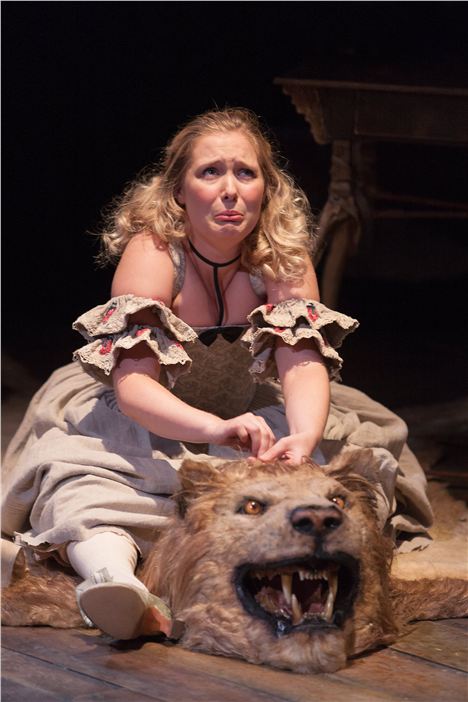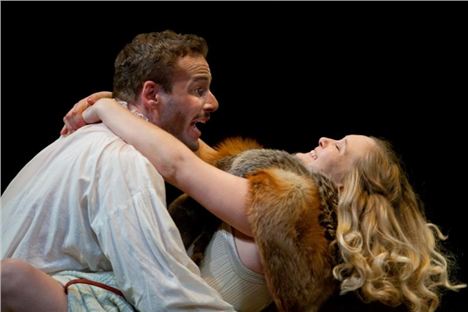THE Country Wife, penned by notorious rakehell William Wycherly, and heaving with puns, romping and genital gesturing, is ostensibly a typical Restoration comedy - but there is a dark edge of sexual violence undercutting the bawdy fun.
On the one hand it reminds husbands not to be so jealous that they actually cause their wives to stray, and on the other not to be so little jealous that they lack passion.
Director Polly Findlay effectively brings out the ambiguities of the source material while cutting out much of the repetition of the original, making it fresher for modern audiences.
The organizing principle of the play is provided by Horner (Felix Scott), a ‘machiavel in love’, whose sexual cunning has inspired him to spread the rumour that he has become impotent and can now only enjoy ‘the manly pleasures of being very drunk and very slovenly’.
Trusting husbands allow Horner unfettered access to their wives, who are as desperate for bedroom entertainment as they are to keep their honourable reputations pristine. The ruse is of course a great success and much of the play’s bawdiness follows from this initial deception, with a trio of respectable town ladies taking full advantage of Horner’s, ahem, skilful swindle.
The parallel plot (featuring the country wife of the title) sees one of Horner’s fellow scoundrels Pinchwife (Nick Fletcher) newly married to rustic beauty Margery (Amy Morgan), whom he believes to be too simple to deceive him. A third plot strand follows Pinchwife’s sister, Alithea (Eliza Collings), who is engaged to archetypal fop Sparkish (Oliver Gomm) but is pursued by the ardently admiring Harcourt (Nicholas Bishop).
Amy Morgan does a fantastic job of playing Margery, the Mrs who hopes to become a mistress, with an earthy, bawdy edge that undercuts the simpering sweetness of her china-doll looks. Her character is an innocent in a town of knowing seducers and seducees, but it is a feral sort of innocence rather than the angelic purity her husband was hoping for. She soon learns London ways, as a very funny letter-writing scene demonstrates, but never quite manages to grasp the importance of maintaining a (counterfeit) reputation in the way the town characters do.
It is tempting to read this as a feminist piece – straight-talking Alithea, who is virtuous while still being witty and passionate, is the centre of the play and held up for our admiration, while her brother Mr Pinchwife is not only villainous, but a hypocrite, fool and the greatest crime of all, Not Much Fun.
However, much commentary about the faithlessness of wives and how keeping a mistress is the preferable option for any right-thinking rogue (plus a shocking instance of sciuridicide), tempers the play’s right-on credentials.
The moral (such as it is) of The Country Wife is ambiguous.
On the one hand it reminds husbands not to be so jealous that they actually cause their wives to stray, and on the other not to be so little jealous that they lack passion.
By playing the Alithea/Harcourt subplot straight, it argues for the joy of romantic love between two equals over a relationship based on calculation and deception, yet warns repeatedly of boredom in a marriage leading to its doom, while conversely recommending that pepping things up with a dalliance or two might be no bad thing. Those who keep up false reputations are hypocrites, yet society is a fault for being too ‘censorious’.
If these nested morals seem circuitous, the farce-style plot reflects that tangle, trotting through such standards as mistaken identities, cross-dressing, switched letters, and of course, a doctor concealed in a huge chest (fnar). All this subterfuge ought to climax (snigger) in a Grand Reveal (smirk) but Wycherly chooses a less punitive ending for his cast of rakes and pleasure-seekers.
The play has its uneven patches - occasionally the speech is muffled and hard to follow, other times clear and simple.
In the main the actors deliver their funniest lines with wit and precision but sometimes the dialogue is curiously flat (the costumes though, festooned with dandyish rosettes, oversized codpieces and, of course, overflowing bosoms, are always consistently amusing). Considering the age of the play, these dips are relatively few and far between. The Country Wife is lively, pretty to look at and an amusing evening’s diversion. Wycherley would have been proud.
THE COUNTRY WIFE runs until 20 October. We have a Confidential deal on as well - for £10 tickets, here.













